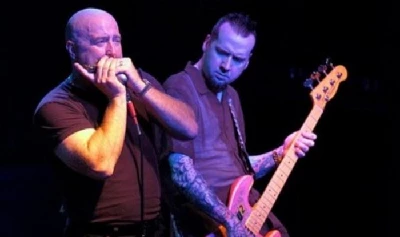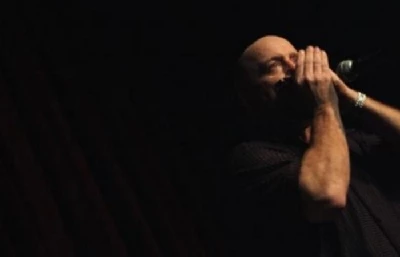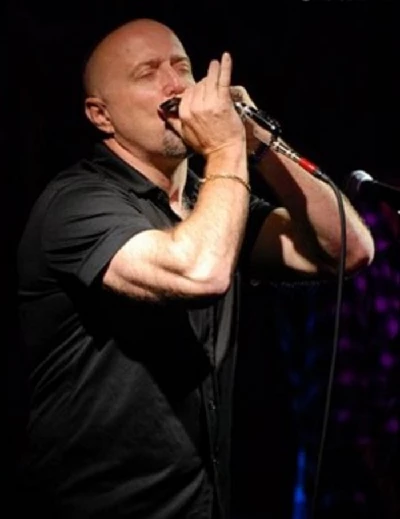Kim Wilson
-
Buddy Guy's Legends, Chicago, 13/2/2010
published: 29 /
4 /
2010

Lisa Torem at Buddy Guy's Legends in Chicago watches harmonica player and Fabulous Thunderbirds front man Kim Wilson play a fantastic two sets of blues with a supergroup of both Chicago and other musicians
Article
Night owls were roosting in Saturday evening captivity when legendary T-Bird Kim Wilson walked on the stage of Buddy Guy’s historically lavish Loop Lounge. Before taking centre stage, Wilson shook hands with some friends, before calling over the rest of the Kim Wilson’s Blues All-Stars for their graveyard double-set.
The famed blues harpist and vocalist wore a skin-tight black shirt. Wilson blew into several chromatic and marine brand harps; setting his flailing blues-licks throughout this packed house.
In fact, the room was so packed for this 11:00 pm set, that the manager, Brian, snuck me a folding chair and led me to a clandestine nook by the pool table. Was this corner the promised land or a scene from 'The Hustler'?
Sitting spread-eagle on this illustrious pool table, were some tough- looking guys and girls with hair-sprayed bouffants. A brunette sat dreamily on her guy’s lap at a bar stool, and a table of local musicians, wearing Crocodile Dundee hats, riveted their eyes to the stage.
Vinyl records from the now-defunct Checker label stood encased in glass frames and, also framed, Guitar Shorty’s wide lapelled jacket screamed out with its radiant red hue. An ice-blue axe framed the walls; it was donated by Lonnie Brooks, as were the trousers by Lightning Hopkins.
Darn! Last call for food was coming up, so I forced myself to concentrate on the stage - even though the perfumed woman at the small table, kitty corner, couldn’t stop talking about the po boy sandwiches.
Kim Wilson is a ramblin’ man. Born in Detroit in the 50s, he made it to the Bay area, and then in Austin, Texas, paired up with guitarist Jimmy Vaughan in 1974 to create the Fabulous Thunderbirds. His solo career has brandished six recordings.
‘Tuff Enuf’ and the instrumental ‘Down at Antoine’s’ were both Grammy nominated. Williams has played with Bonnie Raitt and Carlos Santana, was an integral part of Martin Scorsese’s PBS filmed, all-star blues concert in ’03 and appeared in 'Pocket Full of Soul' which is a harmonica documentary.
His touring sometimes nears 300 days a year. He’s been called, “the greatest harmonica player to come along since Little Walter” by the legendary Muddy Waters. That comparison, of course, sets the blues bar mighty high.
Little Walter combined guitar amp, mic and blues harp to create his legendary sounds. By the 50s he was Muddy Water’s studio harpist at Chess, and in 1952, ‘Juke’ was the dare-devil instrumental that snared the top of the R & B chart. 'My Babe' emitted a yelp back to Willie Dixon’s ‘This Train’, while ‘Everything Gonna Be Alright’ may have been his last Chicago supper, as the blues scene thereafter began to wane.
There’s a heap of history in the room tonight and it’s not just hanging on the walls. Wilson’s performance borrows from and pays tribute to luminaries like Paul Butterfield and Charlie Musselwhite, as well as the traditions of Little Walter’s. ’My Babe’ and ‘Everything Gonna Be Alright’ detours, of course. But, Wilson adds his own repetitive riffs and confident shuffles, and the expertise of the other players keeps the sound fresh.
Are his interpretations of these standards as raw and biting and unpredictable as the original versions? Maybe, we’ll never know. But, they rise to the occasion with great emotion and virtuosity. The night owls are still wide-eyed and nobody’s turning their heads from this untamed T-Bird.
No man is an island, when it comes to the blues. Furthermore, if you gather together a roomful of harp players, they’ll talk your ear off about the finer points. But, there are far worse things to argue about in this insane world, right?
Several musicians here tonight, guitarist Billy Flynn, keyboardist/organist Barrelhouse Chuck Goering, along with Wilson, recorded the soundtrack to the Chess label story, 'Cadillac Records'. But, though their research pointed to the 50s, the commitment to the genre remains high.
Chuck studied with Sunnyland Slim and Little Brother Montgomery, Little Frank Krakowski toured with Pinetop Perkins, Randy Bermudes, bass, and Richard Innes, who doubles in Mannish Boys added their own individual styles.
Wilson brandishes some more harsh blows. But, will he blow the house down? Wilson asks the crowd how they’re doing tonight.
The response is lax, so he blows again. This time a full-bodied response and some laughs ensue, so the band kicks into ‘Same Old Blues.’ Wilson has a solid voice that mixes attitude with humor. Moving, like a cross-eyed garter snake, slyly across the stage, he stops to provide an intrusive Elvis shrug or kick from time to time.
Next up, ‘Good Time Charlie’ keeps the pace. Barrelhouse matches Wilson’s bravado spot-on. With ‘Don’t Bite The Hand That Feeds You.’ He launches into a rich solo. The pay-off, punch line, “I may love you, baby, but I don’t really need you” comes up enough times so that he can flawlessly execute some harp thump and deftly regroup for the vocals. Barrelhouse and Wilson trade some glissandos and during the second round of solos, his harp wails like a rodent caught in a ceiling fan.
The crowd stays with the band, every step of the way, and it seems comfortable enough at this point, that if things slow down, the flow can still be maintained. ‘Black Night is Falling’ starts out moody and somewhat calm, then Wilson pulls out the chromatic, scaling like an acccomplished Himalayan trekker, the low to high spots. Although, if the man’s short on oxygen, we could have been fooled.
Barrelhouse flairs staccato runs and Little Frank, ironically, towering over the rest, delivers a passionate solo. If you close your eyes, Wilson recalls BB’s wrinkle-free vocals. He originally played the guitar and trombone, and you wonder how much mileage he derived from those, too.
He maintains a low, volcanic rumble on the harp before he accentuates some salient lines which bear repetition. His cheeks explode and his eyes hold an element of innocent surprise; like a kid eating Sourpatch candies for the very first time.
The Chuck Berry ‘Living in the USA’ changes the mood entirely, once again. This early rock’n’roll tune, which sounds a heck of a lot like ‘Roll Over Beethoven’ gets some head nods and toe taps from the mostly baby-boomer crowd.
The irresistible sway of his torso and his impromptu stride across the stage, along with the cache of blues memorabilia, make for a night of nostalgia.
“We love you, Kim. We love you,” call some ladies from a table further back. “I love you, too,” he responds, glancing over through the haze. As he launches into ‘Everything’s Gonna Be Alright’ he looks bright and full of enthusiasm; much like his night-owl fans.
His head swiftly moves from side to side, while his eyes scan for movement. Or are they scanning for trouble? Little Frank pulls his electric further up his lanky waist, his short-cropped hair sticks out and his glasses perch on the ledge of his nose. Wilson cups the harp with his hands and wedges it towards the mike.
Innes heats up the drums. “I can’t go out at night without you getting in my face,” Wilson pulses. Then, after Barrelhouse screeches on his B3 organ, Wilson wails, “you treat me like a schoolboy.”
Now, he thins the air with a self-created instrumental reminiscent of Little Walter’s signature piece’Juke.’ He engages in his famed trick; he plays a pulsating rhythm while holding down a singular note. Think church choir meets a stampede of starving elephants. Oh, and to that, add one Tuvan throat singer.
The man’s stomach heaves in and out like a hydraulic pump. It’s a piece that once you start, you’d better maintain, or the magic subsides. So, the huffing and puffing build and the house is indeed brought down. I’m still kind of bummed about the Baton Rouge Rib-Eye that I won’t chow down, but the solo work tonight assuages a bit of my hunger.
The second set is more lively than ever. Barrelhouse’s fingers move so fast, the aftermath of the finger movements send off shadows that resemble smoke rings. Bob Stroger, a local bassist, guest-stars. His wide-brimmed hat swims over his face and his silver guitar pin glistens under the spot light.
Stroger is as happy to be on stage as the rest. Wilson moves his body and muscular hands more expressively now. Everybody’s loosening up the more wee the hours become. But, I’d hate to be a snooze alarm for these guys come morning.
The members alternate vintage dance steps like the frug, and Little Frank actually breaks out into a spasm of giggles. A Freddie King- style stumble drives up the heat. “I’m standing in St. Louis/My baby’s down in San Antoine,” sings Wilson.
The themes tonight, given the genre, are pretty predictable, but it’s alright. Some Charlie Musselwhite harp influences inspire grins. Even the mean guy at the pool table has lightened up.
‘Cadillac Man’ is quintessential blues. These night owls lap it up like honey from a vine. Barrelhouse Chuck is bursting into rhapsodic grins while Wilson wails furiously.
A beautiful blonde woman comes out of the shadows and smiles at the table of blues musicians. The brunette, next to my trusted, but rickety chair, sidles over.
“That’s Kim’s wife. Oh, and I’ve known Little Frank since he was fifteen years old. We came in from South Bend to see the band tonight,” she said
The last number finds Little Frank nursing his slide down his earth-toned electric and a twelve-bar blues harp finale streams from Wilson’s mouth. The solo is gilded with some swampy swing. The band has played for approximately two and a half hours with a short break.
I see Brian, from the corner of my eye, and I guess he wants his hard-ass folding chair back, or am I just getting paranoid? Hunger does that and so does lack of sleep. Some night owls are putting on their coats and a few are finally rubbing their sunken eyes, but the T-Bird is still in flight.
Picture Gallery:-

